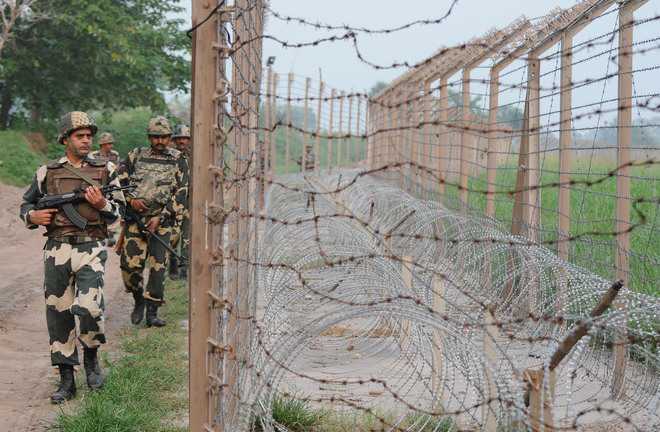
BSF men patrol the India-Pakistan IB on the outskirts of Jammu on Tuesday even as Home Minister Rajnath Singh reviewed the functioning of the force, seeking a real-time intelligence sharing grid and sealing of all vulnerable points along the border to check infiltration and Uri-like attacks. Inderjeet Singh
Tribune News Service
New Delhi, September 27
Prime Minister Narendra Modi has decided to review the unilateral grant of Most Favoured Nation (MFN) status to Pakistan under the World Trade Organisation — an another attempt by New Delhi to increase pressure on Islamabad post Uri attack.
The PM will on Thursday review the decision at a meeting that would be attended by officers of the Ministries of Commerce and External Affairs. This will be second review meeting after the one on Indus Waters Treaty on Monday.
(Follow The Tribune on Facebook; and Twitter @thetribunechd)
India accorded the MFN status to Pakistan in 1996 under the WTO’s General Agreement on Tariffs and Trade. Both India and Pakistan are signatories to the agreement. It means they have to treat each other and the rest of WTO member countries as favoured trading partners. Pakistan is yet to grant India the MFN status.
Under WTO rules, the status implies that every time a country lowers a trade barrier or opens up a market, it has to do so for the same goods and/or services from all trading partners.
The bilateral trade between India and Pakistan stood at $2.61 billion in 2015-16 — with Indian exports at $2.61 billion and imports of $ 441 million. This accounts for a fraction of India’s total merchandise trade of $ 641 billion. Statistics show a good 30 per cent of top 10 Indian exports to Pakistan is cotton while the rest include polypropylene, chickpeas, tomatoes, sugar, yarn etc while imports from Pakistan comprise light oils, dates and cement.
More than the formal trade, the informal trade between the two countries is much higher, with a recent study by economic think-tank ICRIER putting the figure through the India-Dubai route at $4.71 billion—Indian exports at $3.99 billion and imports at $72 million.
Another study says the bilateral trade potential could be around $10 billion, with Indian exports around $7.9 billion and imports from Pakistan at $3 billion. The withdrawal of MFN status is likely to hurt Pakistani industry, say experts. “Pakistans’s industry will squeeze if India decides to withdraw the status.,” international trade expert with the IIFT, Rakesh Mohan Joshi, said. The Federation of Indian Export Organisations said if India stopped exports, “their manufacturing cost will go up.”
Like Indus treaty, will only have symbolic impact
- MFN, mentioned in all the three world agreements on trade, services and intellectual property rights, forms the very basis of a non-discriminatory trading regime
- MFN treatment means a country has to offer similar terms of trade to all its trading partners
- India’s MFN is not really operational because Pakistan has not reciprocated
- India-Pakistan trade is governed by negative lists that are longer than the list of tradable items
- Direct India-Pakistan trade is $3 billion; due to lack of MFN, trade worth about $6 billion is routed via Dubai, Colombo & Singapore
- In 2006, Pakistan was among the last countries to be granted MFN status by India
- Islamists, agriculturists and automotive makers opposed Pakistan’s initial attempt to give MFN status to India
- Finally, Pakistan decided to give India MFN status under a new name – Non Discriminatory Market Access. The process was shelved after the Indian General Election
- Therefore, the decision to review MFN status, much like the review of Indus Waters Treaty, will have a symbolic impact
India-China consensus
Beijing: India and China on Tuesday held their first anti-terrorism talks amid growing India-Pak tension following the Uri terror attacks and reached an "important
consensus" on strengthening cooperation in combating the menace and on measures to jointly deal with security threats. Seen as a significant step forward in anti-terror cooperation following differences over India's bid to get JeM chief Masood Azhar
designated as a terrorist by the UN, top intelligence officials from both countries held candid discussions about stepping up cooperation in counter-terrorism. PTI



























